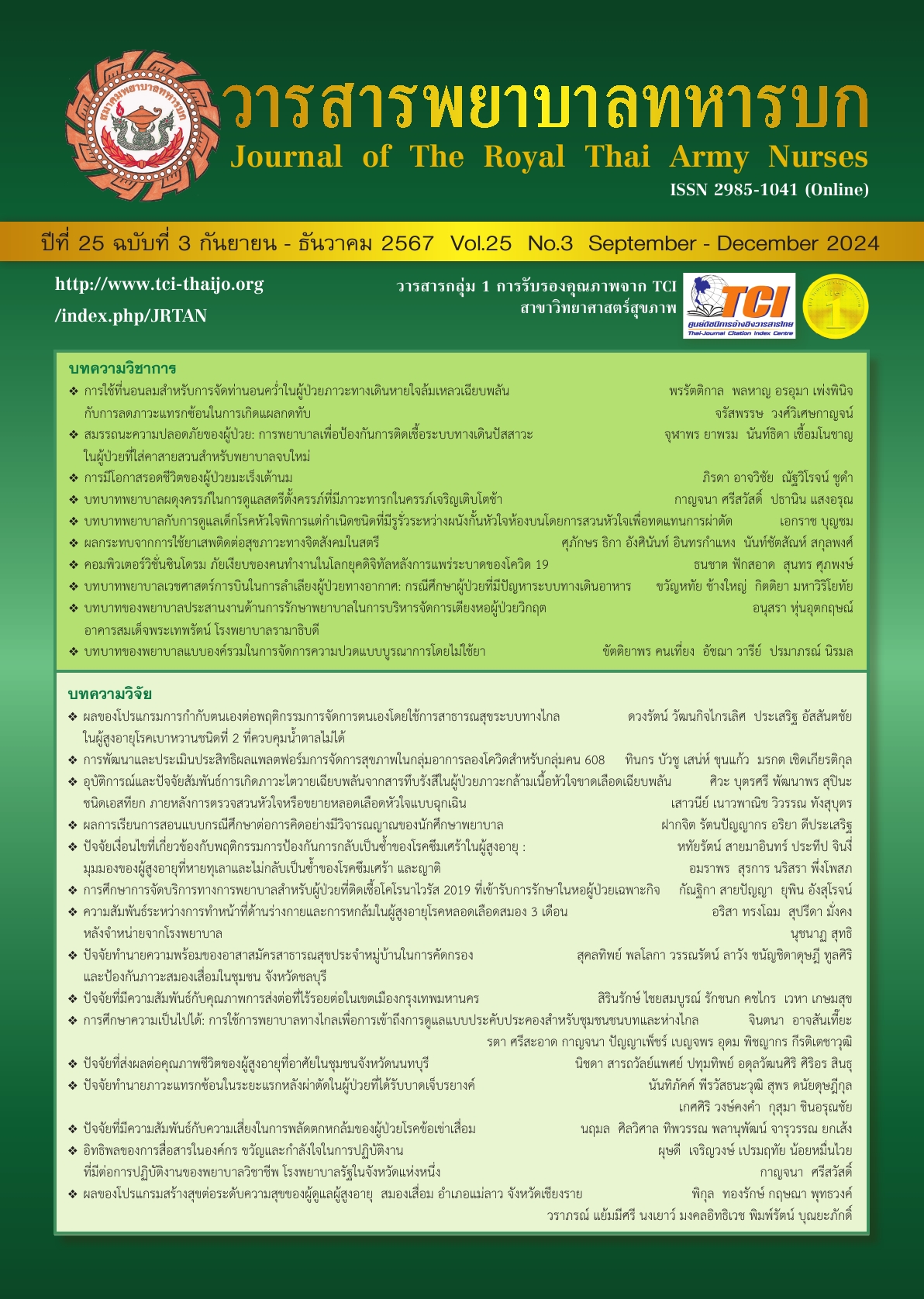Association between Anticholinergic Drug Impact on Nutritional Status in Older Adults at Outpatient Department of Phramongkutklao Hospital
Keywords:
elderly, malnutrition, anticholinergic drugsAbstract
The purposes of this cross-sectional study aimed to investigate the relationship between anticholinergic drug use and malnutrition in older adults. Data were collected using the Mini Nutritional Assessment Short Form (MNA-SF) questionnaire to screen for malnutrition and the Drug Burden Index (DBI) to assess anticholinergic drug use in patients aged over 60 years who visited the outpatient department of Phramongkutklao Hospital.
Data was analyzed using descriptive statistics and logistic regression, The results showed that anticholinergic medication use is associated with an increased risk of malnutrition in elderly. Compared to the control group (MNA-SF ≥ 12), the adjusted odds ratio (AOR) for developing risk of malnutrition (MNA-SF = 11-8) and malnutrition (MNA-SF = 7-0) was 1.78 times (95%CI 1.22 - 2.60, p = .003) and 1.99 times (95%CI 1.24 - 3.18, p = .004), respectively.
This research offers insights for nurses and other healthcare providers to enhance the care of older adults. By implementing strategies to minimize medication side effects and promote safe medication practices.
Downloads
References
Fávaro-Moreira NC, Krausch-Hofmann S, Matthys C, Vereecken C, Vanhauwaert E, Declercq A, et al. Risk Factors for Malnutrition in Older Adults: A Systematic Review of the Literature Based on Longitudinal Data. Advances in Nutrition. 2016;7(3):507–22.
Nathalie Seppala L, Sirpa Hartikainen, Kamkar N, Mallet L, Masud T, et al. European position paper on polypharmacy and fallrisk-increasing drugs recommendations in the World Guidelines for Falls Prevention and Management: implications and implementation. European Geriatric Medicine. 2023.
Chen YC, Huang HH, Fan JS, Chen MH, Hsu TF, Yen DHT, et al. Comparing Characteristics of Adverse Drug Events Between Older and Younger Adults Presenting to a Taiwan Emergency Department. Medicine. 2015; 94(7):e547.
Gerretsen P, & Pollock BG. Drugs with anticholinergic properties: a current perspective on use and safety. Expert Opinion on Drug Safety. 2011; 10(5):751–65.
American Geriatrics Society. American Geriatrics Society 2023 Updated AGS Beers Criteria® for Potentially Inappropriate Medication Use in Older Adults. Journal of the American Geriatrics Society. 2023;71(7):2052-81.
O’Mahony D. STOPP/START criteria for potentially inappropriate medications/ potential prescribing omissions in older people: origin and progress. Expert Review of Clinical Pharmacology. 2020;13(1):15-22
O’Connell J, Henman MC, Burke É, Donegan C, McCallion P, McCarron M, et al. Association of Drug Burden Index with grip strength, timed up and go and Barthel index activities of daily living in older adults with intellectual disabilities: an observational cross-sectional study. BioMed Central Geriatrics. 2019;19(1):173
Lim R, Kalisch Ellett LM, Widagdo IS, Pratt NL, & Roughead EE. Analysis of anticholinergic and sedative medicine effects on physical function, cognitive function, appetite and frailty: a cross-sectional study in Australia. British Medical Journal Open. 2019;9(9):e029221.
Department of Medical services Ministry of Public Health. Elderly Screening Manual 2564 Ministry of Public Health. Bangkok: Najanta Creation Co;2021. (in Thai)
Castejón-Hernández S, Latorre-Vallbona N, Molist-Brunet N, Cubí-Montanyà D, & Espaulella-Panicot J. Association between anticholinergic burden and oropharyngeal dysphagia among hospitalized older adults. Aging Clinical and Experimental Research. 2021;33(7):1981-5.
Ates Bulut E, Erken N, Kaya D, Dost FS, & Isik AT. An Increased Anticholinergic Drug Burden Index Score Negatively Affect Nutritional Status in Older Patients Without Dementia. Frontiers in Nutrition. 2022;9:789986.
Naharci MI, Katipoglu B, & Tasci I. Association of anticholinergic burden with undernutrition in older adults: A cross-sectional study. Nutrition in Clinical Practice. 2022;37(5):1215-24.
Kose E, Hirai T, Seki T, & Yasuno N. Anticholinergic Load and Nutritional Status in Older Individuals. The journal of nutrition, health & aging. 2019;24(1):20–7.
Kaiser MJ, Bauer JM, Ramsch C, Uter W, Guigoz Y, Cederholm T, et al. Validation of the Mini Nutritional Assessment short-form (MNA®-SF): A practical tool for identification of nutritional status. The Journal of Nutrition, Health and Aging. 2009;13(9):782–8.
Hilmer SN. A Drug Burden Index to Define the Functional Burden of Medications in Older People. Archives of Internal Medicine. 2007;167(8):781–7
Kouladjian L, Gnjidic D, Chen T, Hilmer S, & Mangoni A. Drug Burden Index in older adults: theoretical and practical issues. Clinical Interventions in Aging. 2014;9(9):1503-15.
Nishtala PS, Narayan SW, Wang T, & Hilmer SN. Associations of drug burden index with falls, general practitioner visits, and mortality in older people. Pharmacoepidemiology and Drug Safety. 2014;23(7):753–8.
Amarya S, Singh K, & Sabharwal M. Changes during aging and their association with malnutrition. Journal of Clinical Gerontology and Geriatrics. 2015;6(3):78–84.
Kok WE, Haverkort EB, Algra YA, Mollema J, & Hollaar VRY, Naumann E, et al. The association between polypharmacy and malnutrition(risk) in older people: A systematic review. Clinical Nutrition European Society for Clinical Nutrition and Metabolism. 2022;49:163-71.
Atchara S, Nutthakritta S, Prasertsak K, & Sombut O. Factors Related to a Fall Prevention Behaviors of Elderly. Journal of The Thai Army Nurses. 2017;18(1), 215-22. (in Thai)
Sukrita M. The Relationships between Knowledge, The Number of Drugs Used and Drug Use Problems among Elderly Patients with Chronic Illness at A Medical Clinic. Journal of The Royal Thai Army Nurses. 2022;23(3), 504-11. (in Thai)
Downloads
Published
How to Cite
Issue
Section
License
Copyright (c) 2024 Journal of The Royal Thai Army Nurses

This work is licensed under a Creative Commons Attribution-NonCommercial-NoDerivatives 4.0 International License.
บทความหรือข้อคิดเห็นใดใดที่ปรากฏในวารสารพยาบาลทหารบกเป็นวรรณกรรมของผู้เขียน ซึ่งบรรณาธิการหรือสมาคมพยาบาลทหารบก ไม่จำเป็นต้องเห็นด้วย
บทความที่ได้รับการตีพิมพ์เป็นลิขสิทธิ์ของวารสารพยาบาลทหารบก
The ideas and opinions expressed in the Journal of The Royal Thai Army Nurses are those of the authors and not necessarily those
of the editor or Royal Thai Army Nurses Association.






